The Director as Sociopath …
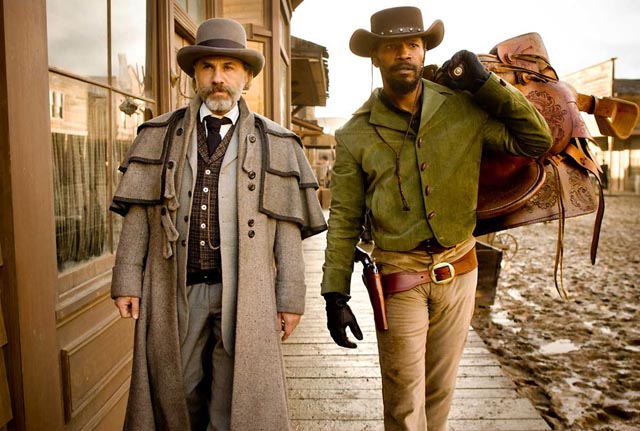
Quentin Tarantino has formidable filmmaking skills, rooted in his deep knowledge of movies famously acquired during his years as a video store clerk. His ability to create images, to build fluid visual progressions and elaborate displays of action, is complemented by a savant’s dazzling knack for exhilaratingly wordy dialogue rich in non-narrative tangents and the kind of discursive pop culture riffs which suddenly make you sharply aware of something you’ve known all along but have never really thought about before … at his best, Tarantino seems to have the power to make manifest the clutter stowed in the back of the viewer’s mind, and he does it in a way which flatters the viewer for sharing his awareness.
When I first saw Reservoir Dogs at the Toronto film festival in 1992, I was struck by the sequence in which Tim Roth is trained for undercover police work. This was flawless visual storytelling working on multiple levels. Then we got to the scene in which Michael Madsen tortures the captured police officer and I was appalled. I left the film with a feeling of deep disgust because what I sensed was a complete lack of distance between director and character … not the victim, but the perpetrator of the violence. It seemed unavoidable to conclude that the filmmaker identified with the sadist, that he enjoyed the torture as much as the character did and that he fully expected the audience to share that enjoyment.
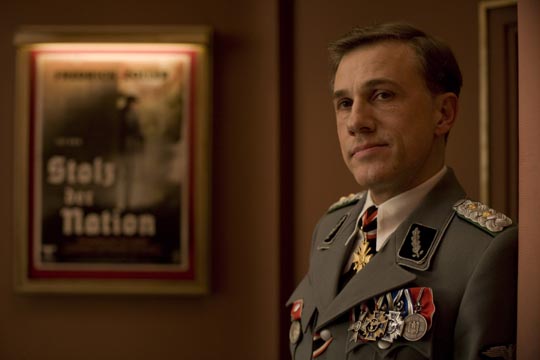
Ever since then, there has been this strange dichotomy in Tarantino’s work, a tension between the often breathtaking facility of the filmmaking and what seems to be a total lack of empathy for the victims of the violence he so energetically puts up there on the screen. Blood and pain remain for him a kind of dark joke, and those who inflict it on others are his comedians. Even in Inglourious Basterds, in that opening scene in the farmhouse, Tarantino (and the viewer) falls in love with the sly, verbally adroit Nazi played by Christoph Waltz … and the Jews slaughtered beneath the floorboards don’t even register as people.
I guess what I’m saying is that, as a filmmaker, Tarantino is a kind of high functioning sociopath. His work is rich in cleverness, in charm, it has the power to draw the viewer into its hyper-real cinematic universe, offering visual and verbal pleasures beyond the capability of most other directors … and yet his work is utterly devoid of the empathy which is essential to genuine art, drama or literature. I find myself frequently entertained by Tarantino, and simultaneously appalled that I’m entertained.
While Pulp Fiction consisted of several interlocking narratives which circle each other and wind up in a satisfying sense of order, Inglourious Basterds has two parallel storylines – the one involving the Jewish refugee Shosanna Dreyfus (Melanie Laurent), hiding out as the manager of a repertory movie theatre in Paris, and Colonel Hans Landa, the SS officer who, for his own amusement, allowed her to escape from that opening massacre; and the one involving Lt. Aldo Raine (Brad Pitt) and his commandos operating in Occupied France. The Dreyfus storyline offers an interesting and suspenseful dissertation on the intersection of film and history culminating in an overwrought revenge fantasy in which Hitler is assassinated at a movie premiere (film ultimately supplanting history in an attempt to provide an emotional satisfaction which reality denied to history’s victims). The Raine storyline on the other hand is a crude series of sadistic killings committed by a bunch of thugs.
In Tarantino’s world, the audience is expected to cheer and laugh at the sadistic violence of the “good guys” while despising the “bad guys” … all that matters is that Raine’s men are Americans and Landa is German. Strange thing is, the bad guy is witty, articulate and cultured while the good guys are moronic thugs. Tarantino, so in love with his ability to write the kind of dialogue Landa speaks and obviously enjoying Waltz’s richly comedic performance, seems completely unaware of all the moral confusions running through the movie.
Django Unchained
Tarantino’s new movie exhibits all his faults and some of his strengths. The opening title sequence is guaranteed to raise the pulse of a spaghetti western fan: Robert Richardson’s grainy, over-saturated cinematography looks just like a movie from the late ’60s, early ’70s; the big bold titles look authentic; the rocky desert landscape is appropriate; it’s all accompanied by the original theme song from Sergio Corbucci’s Django (1966).
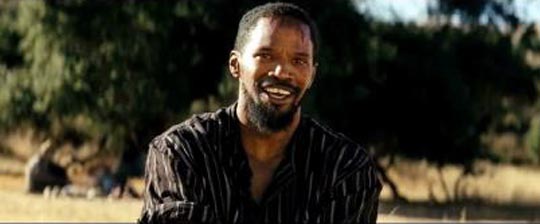
This opening segues quickly into a purely “Tarantino” sequence in which two men leading a string of chained slaves through forest are confronted by an extremely talkative man driving a wagon on top of which a huge tooth waves on a spring. Dr Schultz is looking for a particular slave and when the two men refuse to sell the man to him, he kills one and then kills the other’s horse, pinning him beneath the dead animal. Dr Schultz (Christoph Waltz) releases Django (Jamie Foxx) and leaves the remaining slaver to his captives.
Schultz, no longer a dentist, is a bounty hunter looking for the Brittle Brothers, three men who used to work as overseers at the plantation where Django lived with his wife Broomhilda (Kerry Washington), in fact the men who whipped his wife and then sold the two of them off to different buyers. Schultz needs Django to identify them. So … a classic set-up with the promise of an ultimate confrontation and righteous revenge.
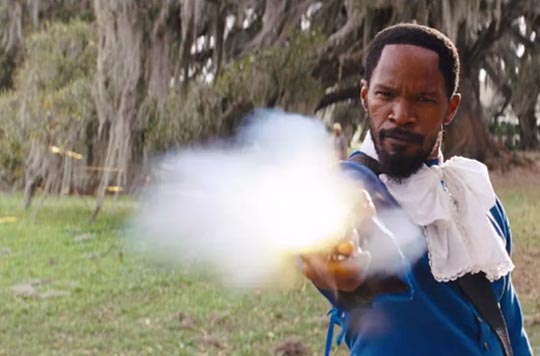
The essence of a good genre film is the balance maintained between fulfilling prior expectations and adding in new and unexpected elements; too much of the former and the work becomes formulaic, too much of the latter and viewers may lose their bearings and become frustrated. Here Tarantino has the two hunters easily find their prey at the first place they stop. The Brittles are quickly killed, eliminating that initial dramatic motor; any suggestion of plausibility vanishes as plantation-owner Don Johnson accepts the idea that a black man shooting the white brothers on his property is legal and allows Django and Schultz to ride away with the bodies.
After this the script starts to ramble episodically, a collection of sequences without a compelling through-line. For a while, Schultz trains Django in the trade and finally, about half way through the almost three-hour running time, they finally get a lead on Broomhilda’s location. She was bought by a brutal plantation owner named Calvin Candie (Leonardo DiCaprio). So the pair cook up a plan to get in with Candie and try to buy her back …
By this point any real sense of tension has dissipated thanks to Tarantino’s love of long discursive conversations. Waltz has to carry the bulk of the movie alone as Foxx is generally silent, offering little more than angry scowls, and for a while Dr Schultz is entertaining enough to make you ignore the way the movie deflates as it progresses. But the leisurely pace also gives you time to wonder about just what it is that Tarantino is trying to do.
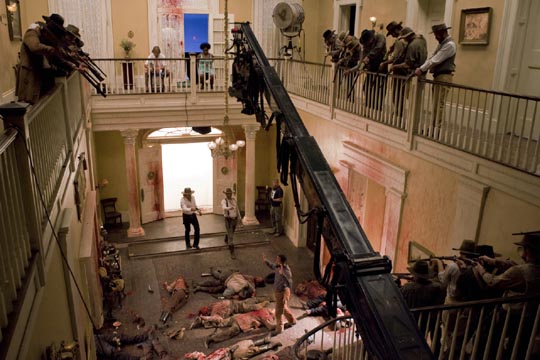
He picks the name Django, but his script has as little to do with Corbucci’s anti-hero as most of the European movies which appropriated the name for box office cachet in the ’60s and ’70s. And, despite apparently wanting to do an homage to the genre (he even includes an in-joke with Foxx meeting the original Django, Franco Nero, and telling him how to spell the name), he relocates the action to the South rather than the southwest and instead of the frontier, we get the slave states two years before the Civil War. So we can assume that Tarantino has something he wants to say about the institution of slavery and its place in American history … except it quickly becomes apparent that he’s just using slavery to power a revenge fantasy similar to the one at the heart of Inglourious Basterds, slave-owners becoming generic villains like that film’s Nazis. Richard Fleischer’s Mandingo (1975) and Jacopetti and Prosperi’s Addio Zio Tom (1971) have far more to say about the social and moral horrors of slavery than Tarantino’s action-comedy does.
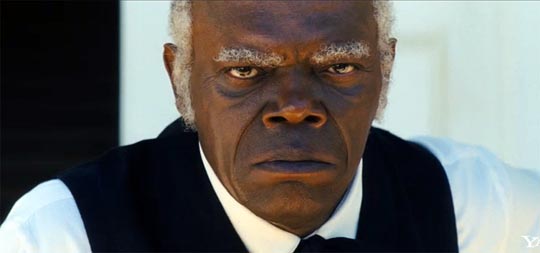
In fact, as the movie plays out, it’s hard not to suspect that the whole reason for setting it in this time and place is Tarantino’s affection for having black actors call each other “nigger” and “motherfucker”. And once we reach Candie’s plantation and discover that the old black retainer Stephen (Samuel L. Jackson) actually runs the place, meting out punishments to disobedient slaves and manipulating Candie, who turns out to be an immature jerk who’s too stupid to realize what’s going on without Stephen pointing things out to him – it starts to seem that the institution of slavery not only rested on compliant blacks, but was actually run by them. In fact, the white establishment is generally treated as a joke, with the film’s funniest scene also proving to be one of its most troubling: Tarantino presents the Klan (here inappropriately present before the Civil War, though in reality they first formed in the wake of the South’s defeat as a reaction to the emancipation of the slaves) as a crowd of buffoons who can barely see through the holes in their hoods, rather than as the vicious terrorists they were in reality.
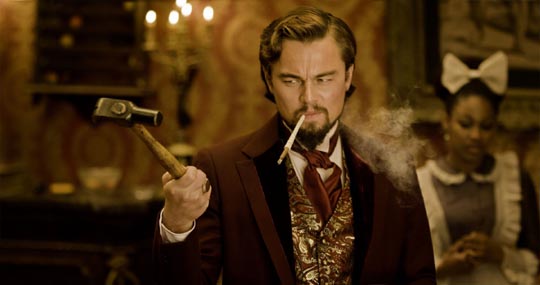
In the remarkably sloppy final stretch of the movie – Tarantino scraps the mythic clarity of the authentic spaghetti western showdown in favour of an overblown bloodbath, quickly disposing of characters we would have expected to be important for a dramatic finale – everything narrows down to Stephen being the final villain, the one who warrants the most protracted death. The implications of this are disturbing, but what made me even more uncomfortable was that, in typical Tarantino fashion, you get the feeling that there’s supposed to be something funny about the way Django dispatches Stephen; at least, at the screening I attended on Christmas Day, by this point the audience was laughing at every death meted out by the righteous killer (a particularly big laugh when he shoots Candie’s sister Lara-Lee [Laura Cayouette], a moment played for slapstick effect).
So not only does Tarantino structure his script to dilute the most basic level of pulp drama, he ends up with a completely muddy view of the history he’s chosen to exploit. Despite some impressive scenes and stretches of amusing dialogue, this long rambling mess may be the worst film he’s made yet. Although he has the freedom to make pretty much anything he wants, he’s forgotten how to tell a satisfying story; narrative coherence is replaced by his desire to shock with transgressive ideas which seem undigested and confused.
Comments
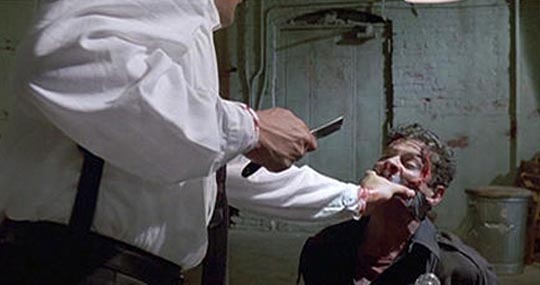
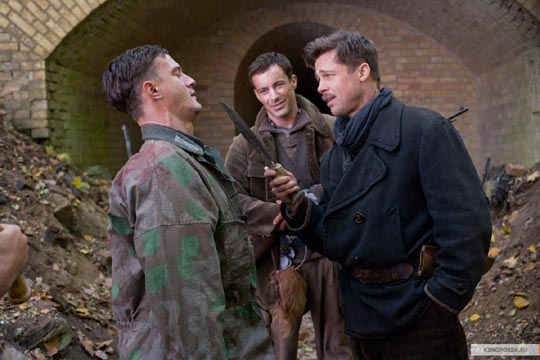
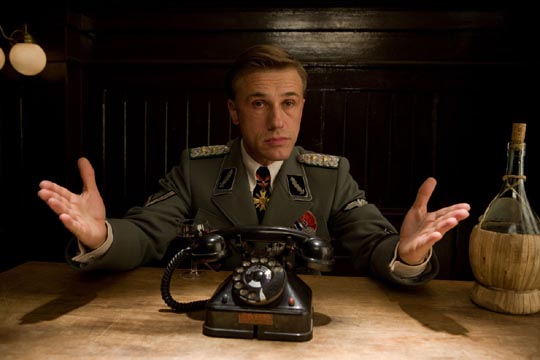
This was brilliant. Thank you.
Thanks. I haven’t seen Hateful Eight yet, but from what I’ve heard Tarantino continues to do the same things in his new film that have bothered me in the rest of his work.
Hateful Eight is a new low for Tarantino in every way. And what is scary is his work gets more popular, and even if some critics’ reviews are tepid, almost no one is saying what you are saying– that the work is actually disturbed. The Atlantic came closest, calling The Hateful 8 ghoulish and toxic. And questioning Tarantino’s fundamentals in terms of basic storytelling. But you nailed it in a way that no one else has. To the extent that I would really appreciate you seeing The Hateful 8 and adding onto this piece. Because I think this piece you wrote is important. And we need it.
Tarantino somehow manages to give his work a kind of seductive surface which seems to lull viewers into accepting them as “entertainment” without realizing just how unpleasant the underlying content really is. Hateful Eight opens here in Winnipeg on Friday, so I will probably go to see it, but more out of a sense of duty and a kind of clinical interest than anything else.
to me, genuine art, while implying empathy to some degree at least, is actually defined by its ability to change you in some way, to make you seriously question things, and ultimately yourself. by this definition, in criticizing Tarantino you are actually praising him, especially since the appalling elements function exactly via the empathy you claim he’s lacking. i don’t know if he’s a sociopath or not, but he certainly does a good job of making the audience react to facets and implications of that (stereo)type.
I’m not sure I buy your argument – though perhaps the point is too subtle for me!
It seems a bit like saying that Donald Trump’s speeches are really socially progressive because they provoke moral outrage in a lot of people.
Tarantino isn’t running for president though.
besides that, your take on Trump is interesting and might be somewhat valid.
Tarantino is a high functioning sociopath.
He is a drug addicted sadist with violent fantasies which he puts into his movies.
Idiots who don’t understand movies love Tarantino.
Hollywood supports sadistic sociopaths who make money for the industry of gore and low common denominator garbage.
There is nothing artistic about mass killings for depravity.
There is no message in Taratino movies he is taking you all for fools by talking about themes of revenge.
We as a species are doomed to elevate sociopaths and suck on their teats for their rest of humanity until they destroy us by desensitising us to our own morals.
Omg thank you thank you thank you. The only thing I will add to what you wrote is that I genuinely think Tarantino has already acted on his violent sadistic fantasies in real life and will continue to act on them. What start as a fantasy almost always becomes a behaviour. And to quote you, “There is nothing artistic about mass killings for depravity”. Indeed.
Tarantino fans are quick to echo Tarantino’s own superficial explanations for his violent garbage masquerading as art.
Spike Lee was right to criticise him.
Just watch what happened to Tarantino as he makes more movies and his addiction to violence and sociopathy progresses.
I think it’s interesting that natural born killers (which he only wrote) is the movie that he is most true to himself. The characters are actual serial killers. The audience response is completely different when it’s not a Jew killing nazis, or a former slave killing slave owners. The uncomfortable audience response to natural born killers, shows how uncomfortable the true version of tarrentino movies really are.